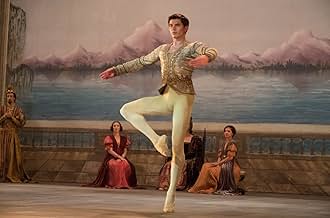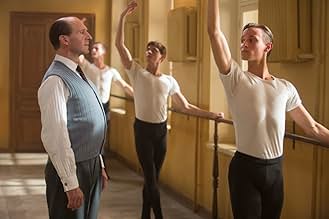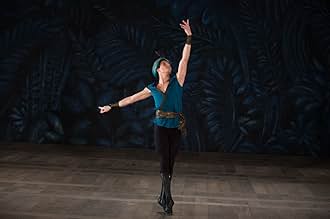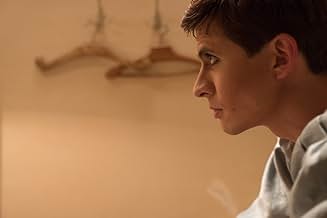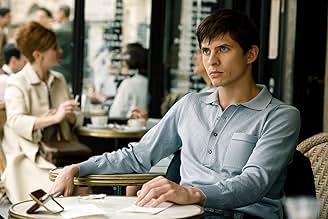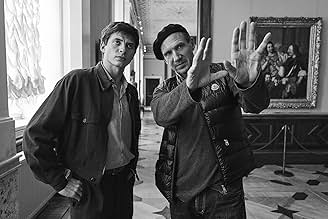IMDb RATING
6.6/10
7.3K
YOUR RATING
The story of Rudolf Nureyev's defection to the West.The story of Rudolf Nureyev's defection to the West.The story of Rudolf Nureyev's defection to the West.
- Awards
- 1 win & 4 nominations total
- Director
- Writers
- All cast & crew
- Production, box office & more at IMDbPro
Featured reviews
Greetings again from the darkness. Nijinsky. Nureyev. Bruhn. Baryshnikov. The legends of male ballet dancers starts with that list, and possibly include a handful of others. Ralph Fiennes directs a screenplay from David Hare that brings us the story of how one of these, Rudolph Nureyev, defected from Russia to the west in 1961.
Opening with Nureyev's teacher Alexander Pushkin being interrogated ("Why did he defect?") by a Russian official immediately after the defection, the film ping pongs between 3 time frames in an attempt to better explain Nureyev's reasons ... or at least the background that created such a headstrong and talented young man. We flashback to 1938 where his mother famously gave birth to him in the confines of a moving train (traveling and trains remained important to him). We then flash forward to 1961 when Nureyev arrives in Paris with the Kirov Ballet, and then back to 1955 as he arrives at the Vaganova Academy of Russian Ballet (established 1738) - a prestigious dance school.
It's actually this hopping from one time frame to another that is the film's weakness. The script is ambitious but ultimately flawed, as it attempts to tackle too much rather than concentrating on what's most important and interesting. We didn't need so many childhood flashbacks to grasp that Nureyev was a different kind of kid who grew up in poverty in Siberia, raised with his sisters by a mother whose husband was away at war. Julie Kavanagh's book "Rudolph Nureyev: The Life" inspired Mr. Hare's screenplay, but the multiple timelines can be more fully explored in book form.
Ralph Fiennes plays the aforementioned Pushkin, a soft-spoken man who was a father figure to Nureyev, as well as a technical instructor. He also shared his philosophy of dance (and his wife - maybe he knew, maybe he didn't) with his star pupil, and it's easy to see how this elevated Nureyev's ability. Combining that with his interest in classic art, a theme of turning ugliness into beauty was something Nureyev latched on to.
Oleg Ivenko stars as Rudolph Nureyev. Ivenko is a marvelous dancer and bears enough resemblance to the legend that we are quickly taken in. Ivenko is not a trained film actor, but as a dancer, he is accustomed to the spotlight and never wavers in his portrayal of a dancer he likely admired. He captures the emotional turmoil of a man enticed by the artistic and social freedoms of the west, while also remaining loyal to his homeland - loyal at least until he felt threatened (both physically and artistically). A tortured genius typically struggles with those in positions of authority and that's on full display here.
This is the third directorial outing for 2-time Oscar nominee (for acting) Ralph Fiennes. His previous projects were THE INVISIBLE WOMAN in 2013 which no one saw, and CORIOLANUS in 2011 which almost no one saw. It's likely his latest won't draw a huge audience either, but Ivenko's dancing is quite something to behold, and the climax at Le Bourget Airport in France is a suspenseful highlight. Nureyev was 23 at the time, and the defection decision is made almost spontaneously with a little help from his socialite friend Clara Saint (Adele Exarchapoulos, BLUE IS THE WARMEST COLOR) and French dancer Pierre Lacotte (Raphael Personnaz). Rudolph Nureyev died of complications from AIDS in 1993, but he truly was a "white crow" - something extraordinary, and one who stands out.
Opening with Nureyev's teacher Alexander Pushkin being interrogated ("Why did he defect?") by a Russian official immediately after the defection, the film ping pongs between 3 time frames in an attempt to better explain Nureyev's reasons ... or at least the background that created such a headstrong and talented young man. We flashback to 1938 where his mother famously gave birth to him in the confines of a moving train (traveling and trains remained important to him). We then flash forward to 1961 when Nureyev arrives in Paris with the Kirov Ballet, and then back to 1955 as he arrives at the Vaganova Academy of Russian Ballet (established 1738) - a prestigious dance school.
It's actually this hopping from one time frame to another that is the film's weakness. The script is ambitious but ultimately flawed, as it attempts to tackle too much rather than concentrating on what's most important and interesting. We didn't need so many childhood flashbacks to grasp that Nureyev was a different kind of kid who grew up in poverty in Siberia, raised with his sisters by a mother whose husband was away at war. Julie Kavanagh's book "Rudolph Nureyev: The Life" inspired Mr. Hare's screenplay, but the multiple timelines can be more fully explored in book form.
Ralph Fiennes plays the aforementioned Pushkin, a soft-spoken man who was a father figure to Nureyev, as well as a technical instructor. He also shared his philosophy of dance (and his wife - maybe he knew, maybe he didn't) with his star pupil, and it's easy to see how this elevated Nureyev's ability. Combining that with his interest in classic art, a theme of turning ugliness into beauty was something Nureyev latched on to.
Oleg Ivenko stars as Rudolph Nureyev. Ivenko is a marvelous dancer and bears enough resemblance to the legend that we are quickly taken in. Ivenko is not a trained film actor, but as a dancer, he is accustomed to the spotlight and never wavers in his portrayal of a dancer he likely admired. He captures the emotional turmoil of a man enticed by the artistic and social freedoms of the west, while also remaining loyal to his homeland - loyal at least until he felt threatened (both physically and artistically). A tortured genius typically struggles with those in positions of authority and that's on full display here.
This is the third directorial outing for 2-time Oscar nominee (for acting) Ralph Fiennes. His previous projects were THE INVISIBLE WOMAN in 2013 which no one saw, and CORIOLANUS in 2011 which almost no one saw. It's likely his latest won't draw a huge audience either, but Ivenko's dancing is quite something to behold, and the climax at Le Bourget Airport in France is a suspenseful highlight. Nureyev was 23 at the time, and the defection decision is made almost spontaneously with a little help from his socialite friend Clara Saint (Adele Exarchapoulos, BLUE IS THE WARMEST COLOR) and French dancer Pierre Lacotte (Raphael Personnaz). Rudolph Nureyev died of complications from AIDS in 1993, but he truly was a "white crow" - something extraordinary, and one who stands out.
A beautiful film. But not so convincing. Correct but easy to reduce it to the last part tension. Interesting portrait of the period, expression of admiration for Nureev art, seductive ballet scenes and the hard try to convince. But, in too many parts, the film remains only a sketch. The good points - hard effort of Oleg Ivanko to create his role and to convince the viewer, the passion of Ralph Fiennes to the project, the presence of Sergei Polunin and the performance of Adele Exarchopoulos. The result is, obvious, a beautiful one . But convince it ? In few points, with indulgence in other.
My wife and I watched this at home on DVD from our public library.
While the focus of this movie is the 1961 defection of ballet dancer Nureyev you can't really tell that part of his life without understanding his beginnings, from being born on a train in 1938 to studying under the demanding Soviet system. Most of that takes up the first half of the movie.
I remember Nureyev well, he was such an inventive dancer and became popular world-wide in the 1960s and 1970s but I never knew his story. When the company of dancers would tour outside the USSR they were not supposed to exchange ideas or even talk to people from other countries but Nureyev never really followed the rules. When it looked like going back home might be bad for him, in France he defected, asking for political asylum. The scenes that retell and dramatize the incident are some of the best in this movie.
For the role Oleg Ivenko, a Ukranian who really is a ballet dancer in Russia and a first-time actor, plays Rudolf Nureyev and he plays him very well.
A really well made movie and a well told story, we enjoyed it.
While the focus of this movie is the 1961 defection of ballet dancer Nureyev you can't really tell that part of his life without understanding his beginnings, from being born on a train in 1938 to studying under the demanding Soviet system. Most of that takes up the first half of the movie.
I remember Nureyev well, he was such an inventive dancer and became popular world-wide in the 1960s and 1970s but I never knew his story. When the company of dancers would tour outside the USSR they were not supposed to exchange ideas or even talk to people from other countries but Nureyev never really followed the rules. When it looked like going back home might be bad for him, in France he defected, asking for political asylum. The scenes that retell and dramatize the incident are some of the best in this movie.
For the role Oleg Ivenko, a Ukranian who really is a ballet dancer in Russia and a first-time actor, plays Rudolf Nureyev and he plays him very well.
A really well made movie and a well told story, we enjoyed it.
The film's title derives from the Russian phrase "belaya vorona", or "white crow", meaning an outsider or nonconformist, a person who stands out from his or her contemporaries in the way that a white crow would stand out from its black fellows. The "white crow" of this film is the Russian ballet dancer Rudolf Nureyev, a man who had difficulty conforming to the official Soviet system, either in his artistic life or in his personal life. (He was gay at a time when this was neither lawful nor acceptable in Soviet society).
Nureyev shocked the world of ballet when he defected to the West at Le Bourget airport, Paris, in 1961, and the film is built around this incident. His decision to defect was, apparently, a spontaneous one, taken when the Communist authorities, irritated by the fact that he had spent much of his time in Paris in the company of Western intellectuals and concerned by rumours that he had been seen in a gay bar, decided to send him back to Russia rather than allowing him to travel with the Kirov ballet to London, the next leg of their tour. Scenes of Nureyev's stay in Paris are intercut with flashbacks to his poverty-stricken wartime childhood in the provincial city of Ufa and to his time as a ballet student in Leningrad, as St Petersburg was then known.
The film was directed by the well-known British actor Ralph Fiennes, clearly a ballet enthusiast. Fiennes also takes an acting role as Alexander Pushkin- not, of course, the classic Russian author but Nureyev's tutor at the Kirov Ballet. This was, I felt, one of two outstanding performances in the film. Pushkin emerges not only as a visionary who spotted Nureyev's talent when many did not but also as a sympathetic father-figure who provided the young dancer with a kindness and understanding that was otherwise lacking in the rigid, inflexible Soviet system. The other great performance, of course, comes from the young Oleg Ivenko as the conflicted Nureyev himself. On the one hand he is held by a love of his Russian homeland, the land which contains all he knows and all that he has held dear- his family, his friends and his mentor Pushkin. On the other hand, he is drawn towards the West, not only because of the greater intellectual freedom which it offers but also because of a feeling that it is only there that he can fully realise himself as a dancer.
I must admit that I am not a great balletomane myself; I have been to the ballet on only a handful of occasions in my life, and never saw Nureyev dance except on television. Yet there are some films which have been good enough able to hold my attention even though they are centred upon activities in which I would normally take little interest. Like most Britons, I know little about baseball, yet I was enthralled by "Eight Men Out" and "Field of Dreams". I probably know even less about wrestling, but that did not prevent me from admiring the more recent "Foxcatcher". "White Crow" comes into the same category. Those who love ballet will doubtless be enthralled by it. Even those of us who do not will be able to see enough in this movie to understand the enthusiasm of those who do. And both groups will join together in their appreciation of the human drama which lies at the heart of Rudolf Nureyev's story. 8/10
Nureyev shocked the world of ballet when he defected to the West at Le Bourget airport, Paris, in 1961, and the film is built around this incident. His decision to defect was, apparently, a spontaneous one, taken when the Communist authorities, irritated by the fact that he had spent much of his time in Paris in the company of Western intellectuals and concerned by rumours that he had been seen in a gay bar, decided to send him back to Russia rather than allowing him to travel with the Kirov ballet to London, the next leg of their tour. Scenes of Nureyev's stay in Paris are intercut with flashbacks to his poverty-stricken wartime childhood in the provincial city of Ufa and to his time as a ballet student in Leningrad, as St Petersburg was then known.
The film was directed by the well-known British actor Ralph Fiennes, clearly a ballet enthusiast. Fiennes also takes an acting role as Alexander Pushkin- not, of course, the classic Russian author but Nureyev's tutor at the Kirov Ballet. This was, I felt, one of two outstanding performances in the film. Pushkin emerges not only as a visionary who spotted Nureyev's talent when many did not but also as a sympathetic father-figure who provided the young dancer with a kindness and understanding that was otherwise lacking in the rigid, inflexible Soviet system. The other great performance, of course, comes from the young Oleg Ivenko as the conflicted Nureyev himself. On the one hand he is held by a love of his Russian homeland, the land which contains all he knows and all that he has held dear- his family, his friends and his mentor Pushkin. On the other hand, he is drawn towards the West, not only because of the greater intellectual freedom which it offers but also because of a feeling that it is only there that he can fully realise himself as a dancer.
I must admit that I am not a great balletomane myself; I have been to the ballet on only a handful of occasions in my life, and never saw Nureyev dance except on television. Yet there are some films which have been good enough able to hold my attention even though they are centred upon activities in which I would normally take little interest. Like most Britons, I know little about baseball, yet I was enthralled by "Eight Men Out" and "Field of Dreams". I probably know even less about wrestling, but that did not prevent me from admiring the more recent "Foxcatcher". "White Crow" comes into the same category. Those who love ballet will doubtless be enthralled by it. Even those of us who do not will be able to see enough in this movie to understand the enthusiasm of those who do. And both groups will join together in their appreciation of the human drama which lies at the heart of Rudolf Nureyev's story. 8/10
First-time actor Oleg Ivenko gives a strong performance here in the lead role of renowned ballet dancer Rudolf Nureyev. The biopic also has a most solid supporting cast and is directed by the fine actor Ralph Fiennes (who also has a supporting role in the film), and is written by the most talented David Hare, based on the book by Julie Kavanagh.
The biopic covers the early years of Nureyev from his most difficult early life in the Soviet Union, his incredible innate talent for ballet dancing, his complicated and flamboyant personality, love of the arts, and a most fervent desire for freedom.
I felt the heart of the movie was the tension filled final 20 minutes or so of Nureyev's defection to the West at a Paris airport, in 1961.He would be the first Soviet notable to do so during the Cold War.
All in all, although this biopic is deliberately paced and a little too long at over 2 hours in length I felt it was a solid effort all around. To note, Rudolph Nureyev would pass away in 1993 from AIDS, at the age of 54.
The biopic covers the early years of Nureyev from his most difficult early life in the Soviet Union, his incredible innate talent for ballet dancing, his complicated and flamboyant personality, love of the arts, and a most fervent desire for freedom.
I felt the heart of the movie was the tension filled final 20 minutes or so of Nureyev's defection to the West at a Paris airport, in 1961.He would be the first Soviet notable to do so during the Cold War.
All in all, although this biopic is deliberately paced and a little too long at over 2 hours in length I felt it was a solid effort all around. To note, Rudolph Nureyev would pass away in 1993 from AIDS, at the age of 54.
Did you know
- TriviaHayden Christensen, who trained extensively in ballet as a child, was first choice to star; however a persistent ankle injury prevented him from being able to perform to the standards demanded by Ralph Fiennes.
- GoofsIn a scene showing a close up of Nureyev's foot performing a tendu, the shoe he is wearing is a white split sole ballet slipper, a shoe that did not exist in the 1960s. Split sole ballet technique shoes have only been on the dance scene since the mid 1990s.
- Quotes
Claire Motte: You are with the company? Did you dance tonight?
Rudolf Nureyev: If I had danced, you would remember.
- ConnectionsFeatured in The White Crow: Ralph Fiennes and Oleg Ivenko in Conversation (2019)
- SoundtracksLa Bayadère 3rd Shade Variation
Composed by Ludwig Minkus
Arranged by Matthias Gohl
Performed by Ilan Eshkeri and The London Metropolitan Orchestra
Details
- Release date
- Countries of origin
- Official sites
- Languages
- Also known as
- Beyaz Karga
- Filming locations
- Production companies
- See more company credits at IMDbPro
Box office
- Gross US & Canada
- $1,828,784
- Opening weekend US & Canada
- $78,782
- Apr 28, 2019
- Gross worldwide
- $7,622,595
- Runtime
- 2h 7m(127 min)
- Color
- Aspect ratio
- 1.85 : 1
Contribute to this page
Suggest an edit or add missing content






